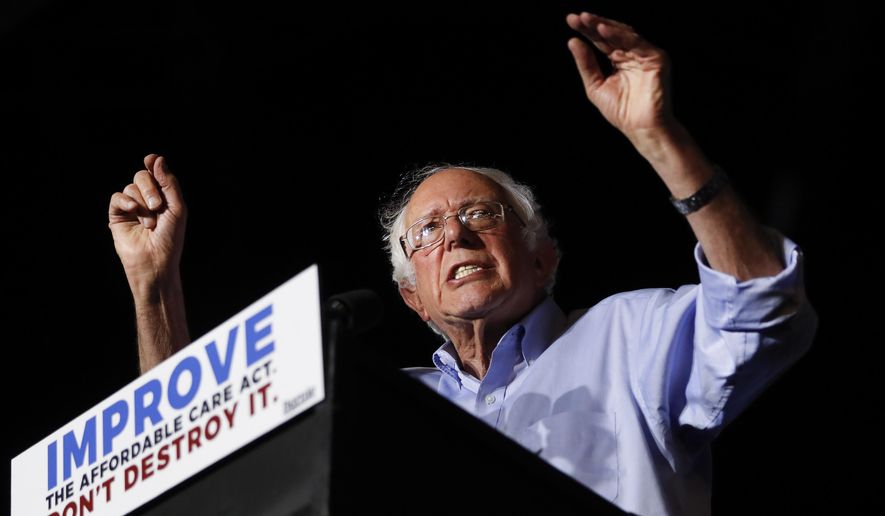High-profile liberals are rushing to back a single-payer system, signing onto the “Medicare for all” bill that Sen. Bernard Sanders will unveil Wednesday and laying the groundwork for the next big health care fight.
Even as Republicans try to revive Obamacare repeal efforts to try to cut federal involvement, Mr. Sanders is poised to push the other direction. He said the 2010 health care law didn’t go far enough in imposing government controls and backstops.
He is winning the backing of some of the Senate’s high-profile Democrats believed to be eyeing presidential bids in 2020 — including Sen. Kirsten Gillibrand of New York, who tweeted her support Tuesday.
Also on board are Sens. Kamala Harris of California, Elizabeth Warren of Massachusetts and Cory A. Booker of New Jersey, all potential 2020 contenders.
“This is something that’s got to happen. Obamacare was a first step in advancing this country, but I won’t rest until every American has a basic security that comes with having access to affordable health care,” Mr. Booker told NJTV on Monday.
Support for a single-payer system is emerging as a pivotal issue for Democratic candidates ahead of the midterm elections next year and the campaign to defeat President Trump, even though that contest is three years away.
SEE ALSO: Chris Murphy proposes a Medicare buy-in plan as Bernie Sanders pushes Medicare for all
But the party’s leaders on Capitol Hill are reluctant to back the plan outright and hoping to avoid the types of litmus tests that divide parties and focus on defending Obamacare from Republican attacks and Mr. Trump’s “sabotage.”
House Minority Leader Nancy Pelosi of California and Senate Minority Leader Charles E. Schumer of New York characterized Mr. Sanders’s effort as just one of a number of proposals that reflect the party’s long-standing pursuit of universal health insurance coverage.
“Before we try it for our country, the idea of trying it for a couple of states seems to be logical,” Sen. Thomas R. Carper, Delaware Democrat, told reporters.
So far, state efforts haven’t been promising.
California, where Democrats control all the levers of power, shelved plans for a single-payer system this year after the state House speaker said its cost would run into the hundreds of billions of dollars.
Implementing a single-payer system nationwide could cost $25 trillion over a decade, the Committee for a Responsible Federal Budget estimated Tuesday. The independent bipartisan public policy organization was looking at a version Mr. Sanders laid out during the presidential campaign last year. The CRFB said $16 trillion of that cost would be new spending, not offset by higher taxes or cuts elsewhere.
Republicans appeared to relish the debate from the sidelines, figuring a debate over “government-run” care would divide their rivals and be a liability for Senate Democrats facing re-election in states that Mr. Trump won by wide margins.
“It seems that this complete government takeover of health care is becoming the litmus test for the liberal left,” said Sen. John Barrasso, Wyoming Republican, noting that Mr. Sanders’s home state of Vermont abandoned a state-level push for single-payer over its high costs.
He said single-payer will force Americans to wait for critical care and stress the Medicare program once it is extended to people younger than 65.
The National Republican Senatorial Committee quickly needled Sen. Tammy Baldwin, a Democrat facing a re-election battle in Wisconsin next year, for backing “the left’s radical plans.” The committee bet it would cost her with voters in a state that gave Mr. Trump a critical election boost in November.
Indeed, the other Democrats who have publicly backed Mr. Sanders’s bill come from reliably blue states: Sens. Jeff Merkley of Oregon, Edward J. Markey of Massachusetts, Sheldon Whitehouse of Rhode Island, Richard Blumenthal of Connecticut, Tom Udall of New Mexico, and Mazie K. Hirono and Brian Schatz of Hawaii.
Yet progressives, emboldened by Republicans’ sputtering plans to repeal and replace the Affordable Care Act, say the time is ripe to advance their cause.
Mr. Sanders, who rose to prominence during his upstart primary campaign against Democratic presidential candidate Hillary Clinton, has championed single-payer care for years. He says it’s unconscionable that one of the richest nations in the world allows tens of millions of its citizens to go uninsured.
Democratic leaders say they are looking at options short of a single-payer system, such as allowing Americans to buy into Medicaid or Medicare insurance or to lower the age of Medicare eligibility to 55.
“We want to move the issue forward. We’re looking at all of this,” Mr. Schumer said.
A Kaiser Family Foundation poll from July said a slim majority like the idea of getting insurance from a single government plan, though support was divided among party lines and shifted with language. For instance, more people like the idea of “Medicare for all” than a “single-payer health insurance system.”
The groundswell of support is a shift from nearly two decades ago, when it was about 40 percent, and for Democrats, who couldn’t rally around a more limited “public option” to compete with private plans during the debate over Obamacare in 2009 and 2010.
Analysts say Democrats will have to settle on policy goals and sell them to the American public. Otherwise, they could end up facing the same challenge that Republicans encountered this year, after years of promising to swiftly repeal and replace Obamacare but without filling in the details.
“As Sen. Sanders himself has seemed to suggest in the past, this is going to be a long, drawn-out process,” said Jim Manley, a Democratic strategist who served as Harry Reid’s spokesman in the Senate. “Proponents have a long-term selling job on their hands as they work to explain to the American people why this is the right way to go.”
• Tom Howell Jr. can be reached at thowell@washingtontimes.com.




Please read our comment policy before commenting.